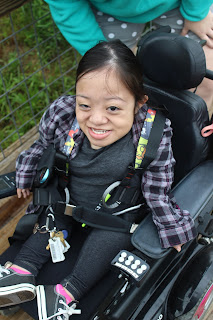I stood in the doorway to the living room – I was frozen. It was a typical Sunday evening for us. We had several pizza boxes spread out on the dining room table and about 30 college students packed in our house. All of these Young Life leaders-in-training had come over to eat and hang out as usual.
But tonight was different. There was something added to the scene that I had never seen before.
I grabbed my pizza and headed into the living room. My sons wrestled with and chased college guys around the house, the din of conversations and the ambience of the football game could be heard, and
Hannah lay on her therapy mat in the middle of the room.
What made this evening different from every other pizza night, was that there in front of me, Kristen was on the mat next to Hannah. She was combing Hannah’s hair with her fingers and talking to her.
Hannah was cooing and laughing and looking in Kristen’s eyes – hearing her and being heard.
Why did I freeze? What was so different about this scene? In the 11 years since Hannah was born, this was the first time that someone other than a family member had taken this kind of notice of her. And, more than that, had really connected with her.
The Young Life podcast “On the Frontier” recently referenced the following quote by Brene Brown from her book, Daring Greatly:
“Connection is the energy that is created between people when they feel seen, heard, and valued; when they can give and receive without judgment.”
“Belonging is the innate human desire to be part of something larger than us. Because this yearning is so primal, we often try to acquire it by fitting in and by seeking approval, which are not only hollow substitutes for belonging, but often barriers to it. Because true belonging only happens when we present our authentic, imperfect selves to the world…"
Kristen took the time to truly connect with Hannah in a way that was meaningful to Hannah. Hannah was seen, heard, and valued by this young college-age woman who would eventually become her first Young Life leader.
So Hannah and Kristen made a connection, but Hannah needs more than that. Hannah yearns to belong. She has a right to belong, and I want that for her and all of my friends with disabilities.
How does one find belonging? Brene Brown says, “true belonging only happens when we present our authentic, imperfect selves to the world.” What I have come to know from parenting a child with significant disabilities and befriending others with disabilities, is that no one presents their “authentic, imperfect selves to the world” better than people with disabilities.
This is a gift that people with disabilities have to offer the body of Christ. Because people with intellectual disabilities are often vulnerable and very accepting of others - presenting their authentic,
imperfect selves in relationships - they help us to do the same.
Able-bodied and able-minded people can, and often do, hide our authentic, imperfect selves. I hold back from letting you see the real me: I might not tell you my internal struggles, I can wear loose clothing if I put on a few pounds, or utilize the “comb-over” if my hair thins any more. I will smile when I’m really sad, and tell you I’m fine when I’m not doing well at all.
But Hannah cannot hide her “authentic, imperfect” self (and I don’t believe she wants to). Hannah’s perceived “weaknesses” are not hidden when you spend time with her. Being with Hannah encourages me to abandon my attempts to fit in and to forsake my need for approval.
We need to discard these false attempts not simply because we are being inauthentic, but because we will not find true belonging while we continue to attempt to deceive others or ourselves.
Disability ministries like YL Capernaum offer the church the opportunity to enter into relationship with a group of people who are much better at creating a community of belonging, when we invite them in.
If belonging is based in presenting our authentic, imperfect selves to the world, and people with disabilities do this better than most of the world, we ought to be falling all over ourselves to invite people of all abilities, in the midst of our imperfections, into our churches. We are robbing ourselves of true connection and belonging by not seeking out friendships with those with disabilities.
Brad Mowry works for Young Life – an international ministry reaching out to adolescents. Brad is the Coordinator for Young Life’s ministry with adolescents with disabilities in the Eastern and Greater NY Divisions (an area that covers everything from Ohio to Virginia to Maine). The Mowrys have 7 children and reside in Western Pennsylvania.








